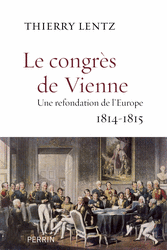This is a masterful study which takes a fresh look at this pivotal diplomatic event in European history.
In the period September 1814 to June 1815, hundreds of representatives of all the European states, whether extant or dissolved, assembled in Vienna, and amidst series of balls, fetes, concerts and theatre performances, after two decades of war in Europe following the establishment of the First Republic in France, they attempted to establish —or re-establish — relationships of equal power within Europe.
The negotiations led by the four main powers, England, Russia, Austria and Prussia, were often rough, and the disagreements were sometimes great, notably in regards to the future of Saxony and Poland, even verging on armed conflict. Even the return of Napoleon to the throne of France for a few months and the consequently perceived necessity of coming together to recommence the war was a source of discord in itself. But when the Final Act was signed on 9 June, 1815 it ushered in nearly a century without a general conflict in Europe.
The work of the congress went beyond the geopolitical framework within which it operated and the strict definition of frontiers between states, and it also allowed new concepts to emerge in the fields of international and institutional law.
(I. Delage, tr. A. Miles)
This book was awarded the prestigious Fondation Pierre Lafue History Prize in 2013.
Le Congrès de Vienne: Une refondation de l’Europe 1814-1815
Author(s) : LENTZ Thierry

- Year of publication :
- 2013
- Place and publisher :
- Paris: Perrin
- Number of pages :
- 385

